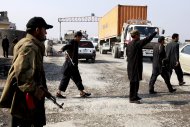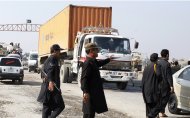WORLD SLIDESHOWS
NZ Prime Minister John Key wins 2nd term
6 photos - 6 hrs agoEgyptian protests, police clashes continue
32 photos - 5 hrs agoYemen: Warplanes kill protesting tribesmen
9 photos - 3 hrs ago
PESHAWAR, Pakistan (AP) — Pakistan on Saturday accusedNATO helicopters and fighter jets of firing on two army checkpoints in the country's northwest and killing 24 soldiers.Islamabad retaliated by closing the border crossings used by the international coalition to supply its troops in neighboringAfghanistan.
The incident before dawn Saturday was a major blow to already strained relations between Islamabad and U.S.-led forces fighting in Afghanistan. It will add to perceptions in Pakistan that the American presence in the region is malevolent, and further fuel resentment toward the weak government in Islamabad for its cooperation with Washington.
It comes a little more than a year after a similar but less deadly strike near the Afghan border in which U.S. helicopters accidentally killed two Pakistani whom the pilots mistook for insurgents. Pakistan responded by closing the Torkham border crossing to NATO supplies for 10 days until the U.S. apologized.
On Saturday, Pakistan went further, closing both of the country's border crossings into landlocked Afghanistan. NATO trucks about 30 percent of the non-lethal supplies used by its Afghan-based forces through Pakistan. A short stoppage will have no effect on the war effort, but serves as a reminder of the leverage Pakistan has over the United States from the supply routes running through its territory.
A spokesman for NATO forces in Afghanistan, Brig. Gen. Carsten Jacobson, said it was "highly likely" that close air support called in by Afghan and coalition forces operating in the border area caused Pakistani casualties. NATO is investigating the incident to determine the exact details, he told BBC television.
Gen. John Allen, the top overall commander of U.S. and NATO forces in Afghanistan, said in a statement that his "most sincere and personal heartfelt condolences go out to the families and loved ones of any members of Pakistan security forces who may have been killed or injured."
Much of the violence in Afghanistan is carried out by insurgents that are based just across the border in Pakistan. Coalition forces are not allowed to cross the frontier to attack the militants. The militants, however, sometimes fire artillery and rockets across the line, reportedly from locations close to Pakistani army posts.
American officials have repeatedly accused Pakistani forces of supporting — or turning a blind eye — to militants using its territory for cross-border attacks. The border issue is the major source of tension between Islamabad and Washington, which wants to stabilize Afghanistan and withdraw its combat troops there by the end of 2014.
Pakistan army chief Gen. Ashfaq Parvez Kayani "strongly condemned" the alleged attack on the two checkpoints, calling it a "blatant and unacceptable act," according to an army statement. It said the "unprovoked" attack was carried out by NATO helicopters and fighter jets, killing 24 soldiers and wounding 13 others. Pakistani soldiers responded in self-defense "with all available weapons," said the statement.
The two checkpoints were around 1,000 feet apart, and one of them was attacked twice, said a government official in Mohmand and a security official in Peshawar, the main city in Pakistan's northwest. Two officers were among the dead, they said, speaking on condition of anonymity because they were not authorized to brief the media.
The attack happened around 2 a.m. on Saturday, Pakistani Prime Minister Yousuf Raza Gilani told reporters.
Ties between Washington and Islamabad already have been hard hit by the covert U.S. commando raid that killed Osama bin Laden in a Pakistani garrison town on May 2. The Pakistanis were outraged that they were not told about the operation beforehand, and now are even more sensitive about U.S. violations of the country's sovereignty.
Gilani summoned U.S. Ambassador Cameron Munter to protest the alleged NATO attack, according to a Foreign Ministry statement. It said the attack was a "grave infringement of Pakistan's sovereignty" and could have serious repercussions on Islamabad's cooperation with NATO. Pakistan has also lodged protests in Washington and NATO headquarters in Brussels, it said.
A Pakistani customs official told The Associated Press that he received verbal orders Saturday to stop all NATO supplies from crossing the border through Torkham in either direction. The operator of a terminal at the border where NATO trucks park before they cross confirmed the closure. They spoke on condition of anonymity because of the sensitivity of the matter.
Saeed Ahmad, a spokesman for security forces at the other crossing in Chaman in southwest Pakistan, said that his crossing was also blocked following orders "from higher-ups."
The U.S., Pakistani, and Afghan militaries have long wrestled with the technical difficulties of patrolling a border that in many places is disputed or poorly marked.
Saturday's incident took place a day after a meeting between NATO's Gen. Allen and Pakistan army chief Gen. Kayani in Islamabad to discuss border operations.
The meeting tackled "coordination, communication and procedures between the Pakistan Army, ISAF (intelligence services) and (the) Afghan Army, aimed at enhancing border control on both sides," according to a statement from the Pakistani side.
The checkpoints that were attacked had been recently set up in Mohmand's Salala village by the army. They were intended to stop Pakistani Taliban militants holed up in Afghanistan from crossing the border and staging attacks, said two local government administrators, Maqsood Hasan and Hamid Khan.
The U.S. helicopter attack that killed two Pakistani soldiers on Sept. 30 of last year took place south of Mohmand in the Kurram tribal area. A joint U.S.-Pakistan investigation found that Pakistani soldiers fired at the two U.S. helicopters prior to the attack, a move the investigation team said was likely meant to notify the aircraft of their presence after they passed into Pakistani airspace several times.
Pakistan moved swiftly after the attack to close Torkham to NATO. Suspected militants took advantage of the impasse to launch attacks against stranded or rerouted trucks carrying NATO supplies.
Senior U.S. diplomatic and military officials eventually apologized for the attack, saying it could have been prevented with greater coordination between the U.S. and Pakistan. Pakistan responded by reopening the border crossing.
____
Abbot reported from Islamabad. Associated Press writers Anwarullah Khan in Khar, Pakistan, Matiullah Achakzai in Chaman and Deb Reichmann in Kabul, Afghanistan contributed to this report.










